Organisational Behaviour: Culture, Motivation, Teams at Rolls Royce
VerifiedAdded on 2023/01/13
|15
|4571
|47
Report
AI Summary
This report provides an analysis of organisational behaviour within Rolls Royce Motor Cars, examining the influence of organisational culture, power dynamics, and politics on individual and team behaviour. It explores various cultural types, power structures (legitimate, reward, coercive, expert, and referent), and the impact of organisational politics on employee satisfaction and productivity. The report further investigates motivational theories, including content theories like Alderfer's ERG theory and process theories like Adam's equity theory, and how they are applied to motivate employees. Additionally, it differentiates between effective and ineffective teams, highlighting the characteristics that contribute to team success. Finally, the report discusses the application of organisational behaviour concepts and philosophies to real-world situations within Rolls Royce, offering insights into how these principles can be leveraged to improve overall organisational performance and achieve business goals. The report concludes by summarizing the key findings and recommendations for the company.
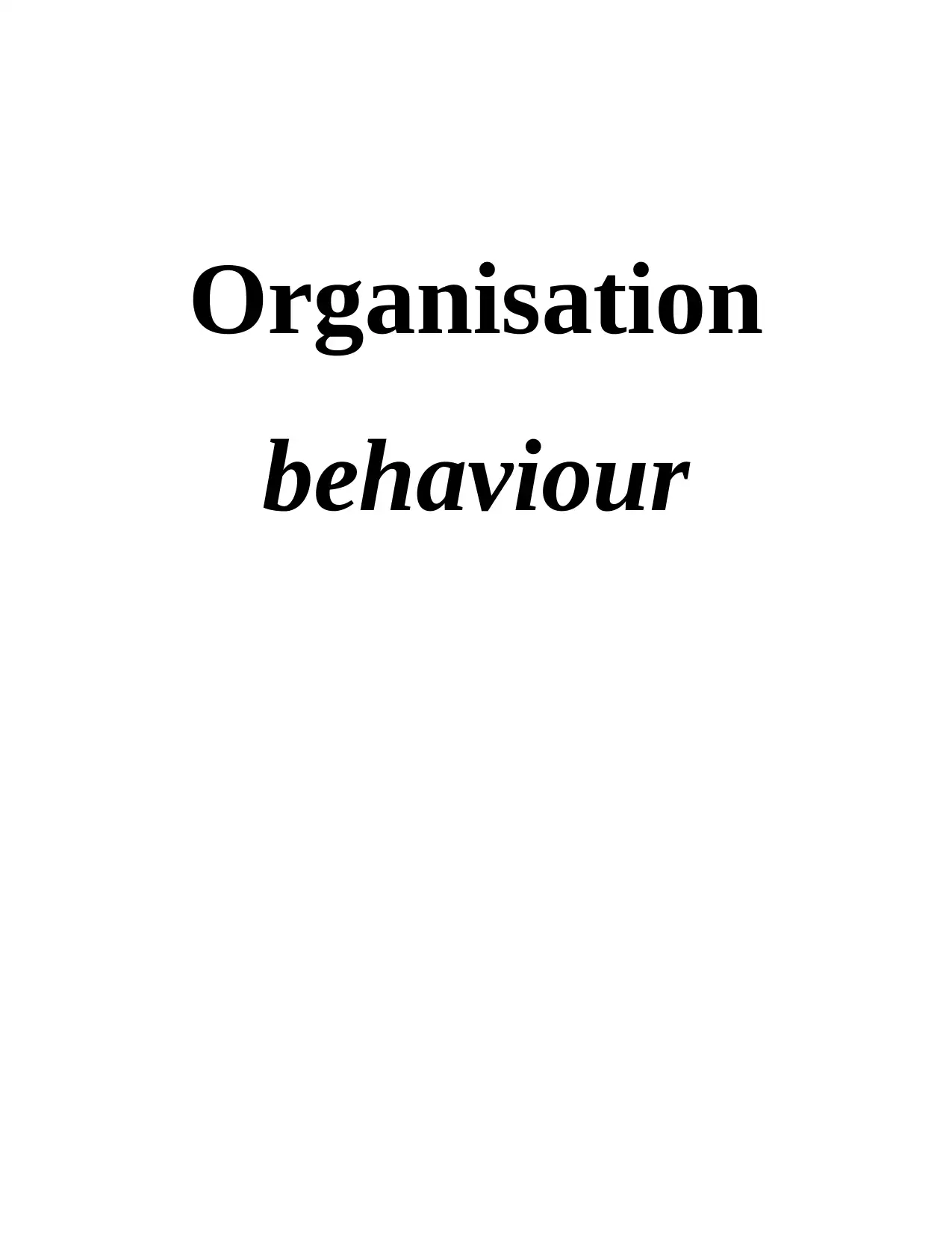
Organisation
behaviour
behaviour
Paraphrase This Document
Need a fresh take? Get an instant paraphrase of this document with our AI Paraphraser
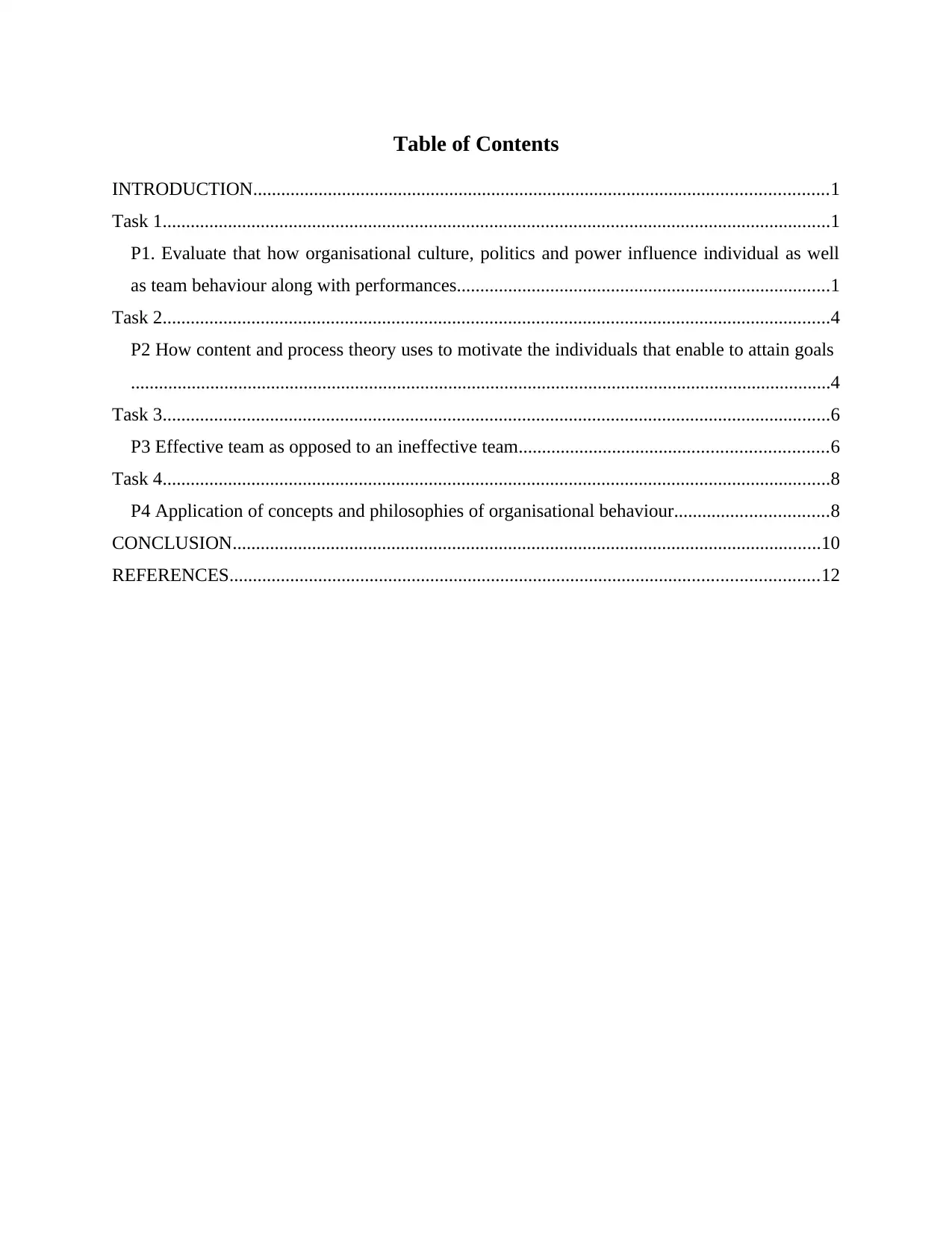
Table of Contents
INTRODUCTION...........................................................................................................................1
Task 1...............................................................................................................................................1
P1. Evaluate that how organisational culture, politics and power influence individual as well
as team behaviour along with performances................................................................................1
Task 2...............................................................................................................................................4
P2 How content and process theory uses to motivate the individuals that enable to attain goals
......................................................................................................................................................4
Task 3...............................................................................................................................................6
P3 Effective team as opposed to an ineffective team..................................................................6
Task 4...............................................................................................................................................8
P4 Application of concepts and philosophies of organisational behaviour.................................8
CONCLUSION..............................................................................................................................10
REFERENCES..............................................................................................................................12
INTRODUCTION...........................................................................................................................1
Task 1...............................................................................................................................................1
P1. Evaluate that how organisational culture, politics and power influence individual as well
as team behaviour along with performances................................................................................1
Task 2...............................................................................................................................................4
P2 How content and process theory uses to motivate the individuals that enable to attain goals
......................................................................................................................................................4
Task 3...............................................................................................................................................6
P3 Effective team as opposed to an ineffective team..................................................................6
Task 4...............................................................................................................................................8
P4 Application of concepts and philosophies of organisational behaviour.................................8
CONCLUSION..............................................................................................................................10
REFERENCES..............................................................................................................................12

⊘ This is a preview!⊘
Do you want full access?
Subscribe today to unlock all pages.

Trusted by 1+ million students worldwide
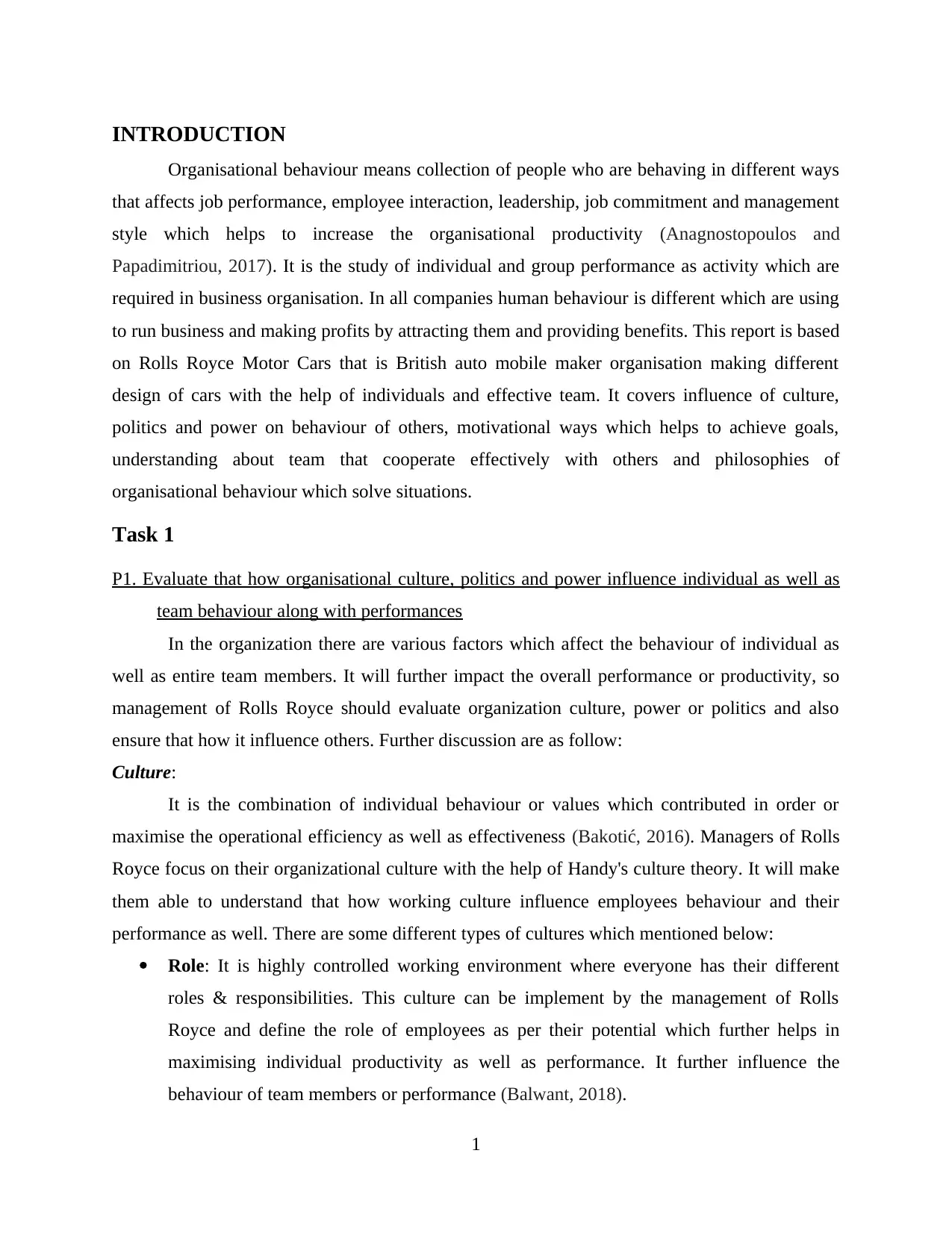
INTRODUCTION
Organisational behaviour means collection of people who are behaving in different ways
that affects job performance, employee interaction, leadership, job commitment and management
style which helps to increase the organisational productivity (Anagnostopoulos and
Papadimitriou, 2017). It is the study of individual and group performance as activity which are
required in business organisation. In all companies human behaviour is different which are using
to run business and making profits by attracting them and providing benefits. This report is based
on Rolls Royce Motor Cars that is British auto mobile maker organisation making different
design of cars with the help of individuals and effective team. It covers influence of culture,
politics and power on behaviour of others, motivational ways which helps to achieve goals,
understanding about team that cooperate effectively with others and philosophies of
organisational behaviour which solve situations.
Task 1
P1. Evaluate that how organisational culture, politics and power influence individual as well as
team behaviour along with performances
In the organization there are various factors which affect the behaviour of individual as
well as entire team members. It will further impact the overall performance or productivity, so
management of Rolls Royce should evaluate organization culture, power or politics and also
ensure that how it influence others. Further discussion are as follow:
Culture:
It is the combination of individual behaviour or values which contributed in order or
maximise the operational efficiency as well as effectiveness (Bakotić, 2016). Managers of Rolls
Royce focus on their organizational culture with the help of Handy's culture theory. It will make
them able to understand that how working culture influence employees behaviour and their
performance as well. There are some different types of cultures which mentioned below:
Role: It is highly controlled working environment where everyone has their different
roles & responsibilities. This culture can be implement by the management of Rolls
Royce and define the role of employees as per their potential which further helps in
maximising individual productivity as well as performance. It further influence the
behaviour of team members or performance (Balwant, 2018).
1
Organisational behaviour means collection of people who are behaving in different ways
that affects job performance, employee interaction, leadership, job commitment and management
style which helps to increase the organisational productivity (Anagnostopoulos and
Papadimitriou, 2017). It is the study of individual and group performance as activity which are
required in business organisation. In all companies human behaviour is different which are using
to run business and making profits by attracting them and providing benefits. This report is based
on Rolls Royce Motor Cars that is British auto mobile maker organisation making different
design of cars with the help of individuals and effective team. It covers influence of culture,
politics and power on behaviour of others, motivational ways which helps to achieve goals,
understanding about team that cooperate effectively with others and philosophies of
organisational behaviour which solve situations.
Task 1
P1. Evaluate that how organisational culture, politics and power influence individual as well as
team behaviour along with performances
In the organization there are various factors which affect the behaviour of individual as
well as entire team members. It will further impact the overall performance or productivity, so
management of Rolls Royce should evaluate organization culture, power or politics and also
ensure that how it influence others. Further discussion are as follow:
Culture:
It is the combination of individual behaviour or values which contributed in order or
maximise the operational efficiency as well as effectiveness (Bakotić, 2016). Managers of Rolls
Royce focus on their organizational culture with the help of Handy's culture theory. It will make
them able to understand that how working culture influence employees behaviour and their
performance as well. There are some different types of cultures which mentioned below:
Role: It is highly controlled working environment where everyone has their different
roles & responsibilities. This culture can be implement by the management of Rolls
Royce and define the role of employees as per their potential which further helps in
maximising individual productivity as well as performance. It further influence the
behaviour of team members or performance (Balwant, 2018).
1
Paraphrase This Document
Need a fresh take? Get an instant paraphrase of this document with our AI Paraphraser
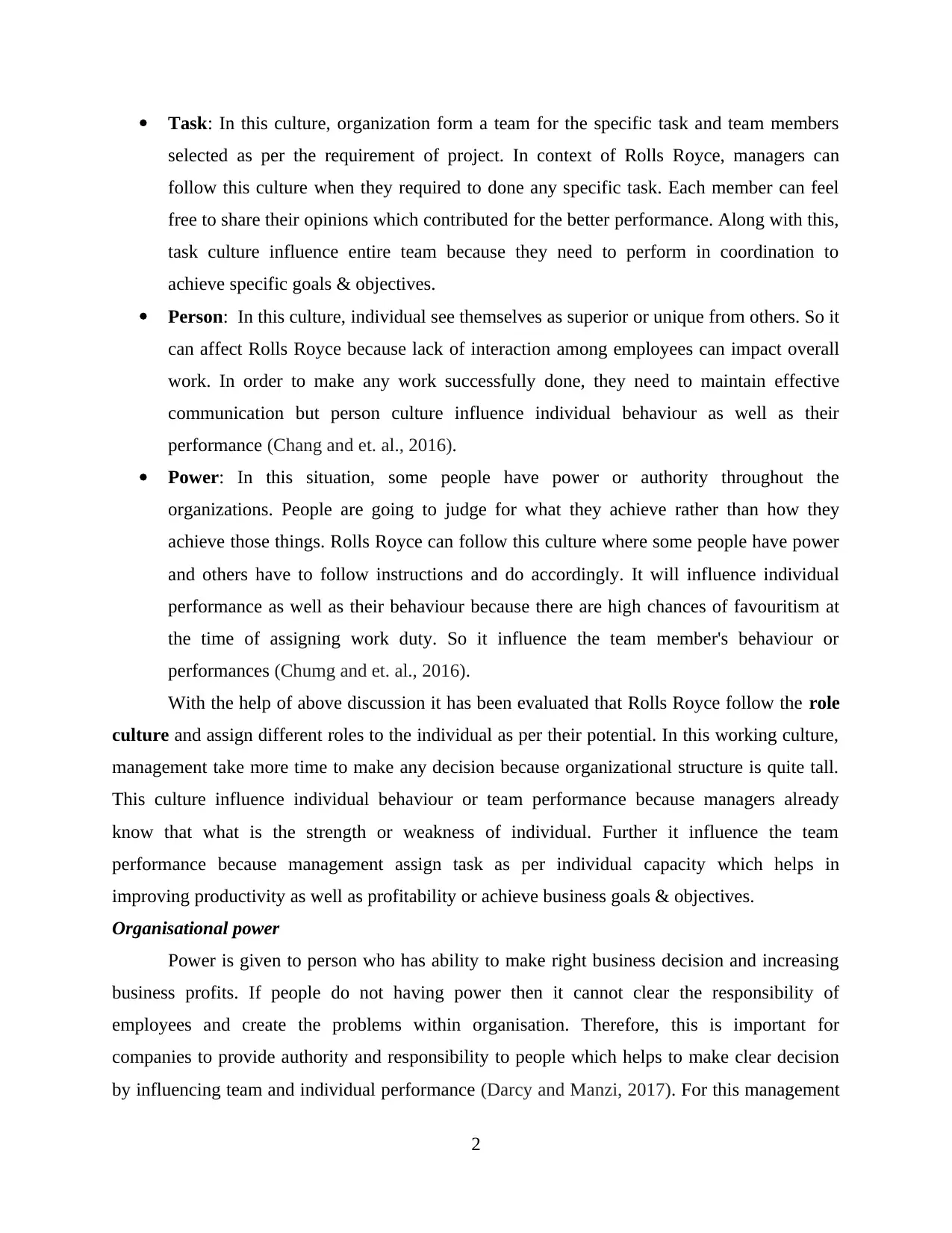
Task: In this culture, organization form a team for the specific task and team members
selected as per the requirement of project. In context of Rolls Royce, managers can
follow this culture when they required to done any specific task. Each member can feel
free to share their opinions which contributed for the better performance. Along with this,
task culture influence entire team because they need to perform in coordination to
achieve specific goals & objectives.
Person: In this culture, individual see themselves as superior or unique from others. So it
can affect Rolls Royce because lack of interaction among employees can impact overall
work. In order to make any work successfully done, they need to maintain effective
communication but person culture influence individual behaviour as well as their
performance (Chang and et. al., 2016).
Power: In this situation, some people have power or authority throughout the
organizations. People are going to judge for what they achieve rather than how they
achieve those things. Rolls Royce can follow this culture where some people have power
and others have to follow instructions and do accordingly. It will influence individual
performance as well as their behaviour because there are high chances of favouritism at
the time of assigning work duty. So it influence the team member's behaviour or
performances (Chumg and et. al., 2016).
With the help of above discussion it has been evaluated that Rolls Royce follow the role
culture and assign different roles to the individual as per their potential. In this working culture,
management take more time to make any decision because organizational structure is quite tall.
This culture influence individual behaviour or team performance because managers already
know that what is the strength or weakness of individual. Further it influence the team
performance because management assign task as per individual capacity which helps in
improving productivity as well as profitability or achieve business goals & objectives.
Organisational power
Power is given to person who has ability to make right business decision and increasing
business profits. If people do not having power then it cannot clear the responsibility of
employees and create the problems within organisation. Therefore, this is important for
companies to provide authority and responsibility to people which helps to make clear decision
by influencing team and individual performance (Darcy and Manzi, 2017). For this management
2
selected as per the requirement of project. In context of Rolls Royce, managers can
follow this culture when they required to done any specific task. Each member can feel
free to share their opinions which contributed for the better performance. Along with this,
task culture influence entire team because they need to perform in coordination to
achieve specific goals & objectives.
Person: In this culture, individual see themselves as superior or unique from others. So it
can affect Rolls Royce because lack of interaction among employees can impact overall
work. In order to make any work successfully done, they need to maintain effective
communication but person culture influence individual behaviour as well as their
performance (Chang and et. al., 2016).
Power: In this situation, some people have power or authority throughout the
organizations. People are going to judge for what they achieve rather than how they
achieve those things. Rolls Royce can follow this culture where some people have power
and others have to follow instructions and do accordingly. It will influence individual
performance as well as their behaviour because there are high chances of favouritism at
the time of assigning work duty. So it influence the team member's behaviour or
performances (Chumg and et. al., 2016).
With the help of above discussion it has been evaluated that Rolls Royce follow the role
culture and assign different roles to the individual as per their potential. In this working culture,
management take more time to make any decision because organizational structure is quite tall.
This culture influence individual behaviour or team performance because managers already
know that what is the strength or weakness of individual. Further it influence the team
performance because management assign task as per individual capacity which helps in
improving productivity as well as profitability or achieve business goals & objectives.
Organisational power
Power is given to person who has ability to make right business decision and increasing
business profits. If people do not having power then it cannot clear the responsibility of
employees and create the problems within organisation. Therefore, this is important for
companies to provide authority and responsibility to people which helps to make clear decision
by influencing team and individual performance (Darcy and Manzi, 2017). For this management
2
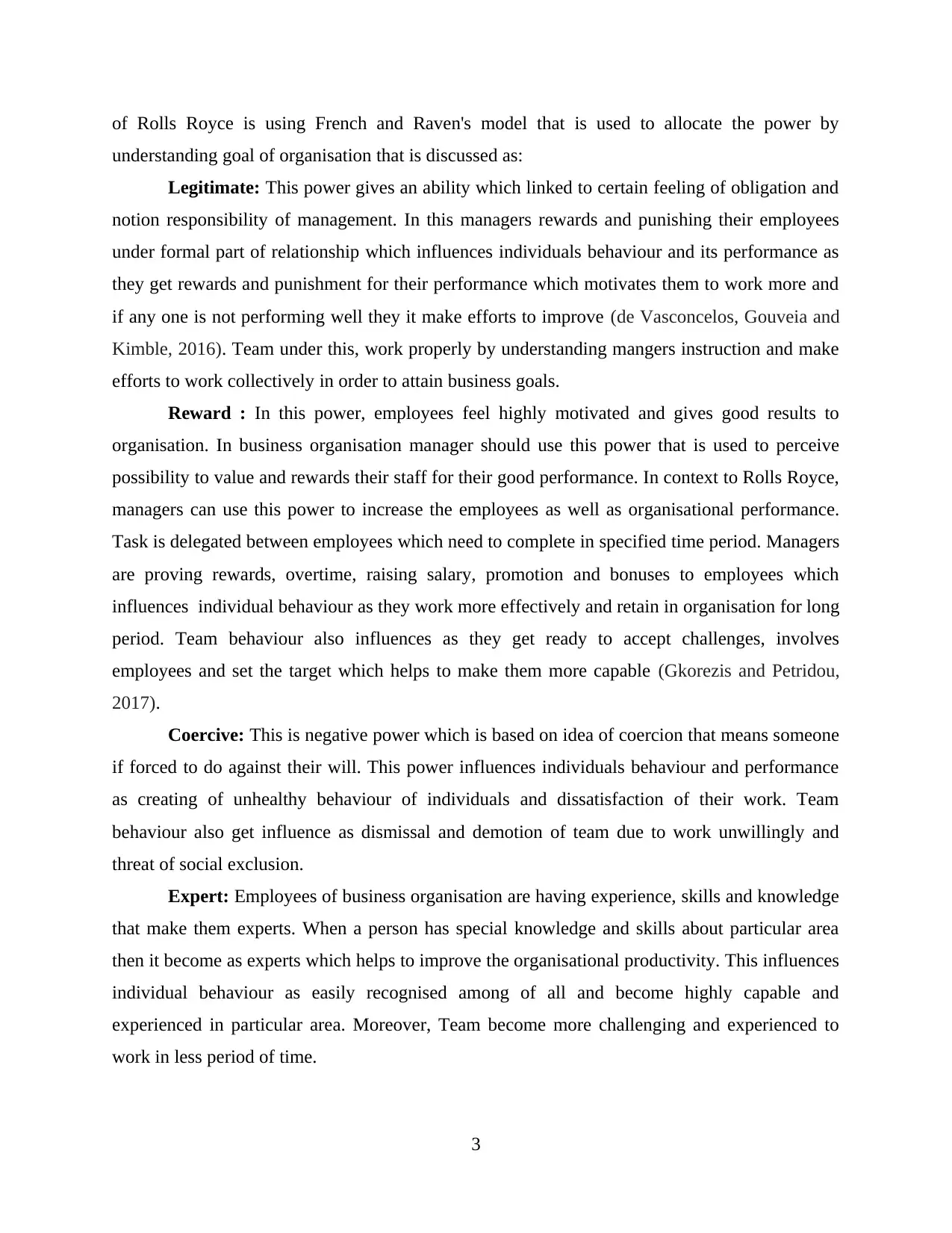
of Rolls Royce is using French and Raven's model that is used to allocate the power by
understanding goal of organisation that is discussed as:
Legitimate: This power gives an ability which linked to certain feeling of obligation and
notion responsibility of management. In this managers rewards and punishing their employees
under formal part of relationship which influences individuals behaviour and its performance as
they get rewards and punishment for their performance which motivates them to work more and
if any one is not performing well they it make efforts to improve (de Vasconcelos, Gouveia and
Kimble, 2016). Team under this, work properly by understanding mangers instruction and make
efforts to work collectively in order to attain business goals.
Reward : In this power, employees feel highly motivated and gives good results to
organisation. In business organisation manager should use this power that is used to perceive
possibility to value and rewards their staff for their good performance. In context to Rolls Royce,
managers can use this power to increase the employees as well as organisational performance.
Task is delegated between employees which need to complete in specified time period. Managers
are proving rewards, overtime, raising salary, promotion and bonuses to employees which
influences individual behaviour as they work more effectively and retain in organisation for long
period. Team behaviour also influences as they get ready to accept challenges, involves
employees and set the target which helps to make them more capable (Gkorezis and Petridou,
2017).
Coercive: This is negative power which is based on idea of coercion that means someone
if forced to do against their will. This power influences individuals behaviour and performance
as creating of unhealthy behaviour of individuals and dissatisfaction of their work. Team
behaviour also get influence as dismissal and demotion of team due to work unwillingly and
threat of social exclusion.
Expert: Employees of business organisation are having experience, skills and knowledge
that make them experts. When a person has special knowledge and skills about particular area
then it become as experts which helps to improve the organisational productivity. This influences
individual behaviour as easily recognised among of all and become highly capable and
experienced in particular area. Moreover, Team become more challenging and experienced to
work in less period of time.
3
understanding goal of organisation that is discussed as:
Legitimate: This power gives an ability which linked to certain feeling of obligation and
notion responsibility of management. In this managers rewards and punishing their employees
under formal part of relationship which influences individuals behaviour and its performance as
they get rewards and punishment for their performance which motivates them to work more and
if any one is not performing well they it make efforts to improve (de Vasconcelos, Gouveia and
Kimble, 2016). Team under this, work properly by understanding mangers instruction and make
efforts to work collectively in order to attain business goals.
Reward : In this power, employees feel highly motivated and gives good results to
organisation. In business organisation manager should use this power that is used to perceive
possibility to value and rewards their staff for their good performance. In context to Rolls Royce,
managers can use this power to increase the employees as well as organisational performance.
Task is delegated between employees which need to complete in specified time period. Managers
are proving rewards, overtime, raising salary, promotion and bonuses to employees which
influences individual behaviour as they work more effectively and retain in organisation for long
period. Team behaviour also influences as they get ready to accept challenges, involves
employees and set the target which helps to make them more capable (Gkorezis and Petridou,
2017).
Coercive: This is negative power which is based on idea of coercion that means someone
if forced to do against their will. This power influences individuals behaviour and performance
as creating of unhealthy behaviour of individuals and dissatisfaction of their work. Team
behaviour also get influence as dismissal and demotion of team due to work unwillingly and
threat of social exclusion.
Expert: Employees of business organisation are having experience, skills and knowledge
that make them experts. When a person has special knowledge and skills about particular area
then it become as experts which helps to improve the organisational productivity. This influences
individual behaviour as easily recognised among of all and become highly capable and
experienced in particular area. Moreover, Team become more challenging and experienced to
work in less period of time.
3
⊘ This is a preview!⊘
Do you want full access?
Subscribe today to unlock all pages.

Trusted by 1+ million students worldwide
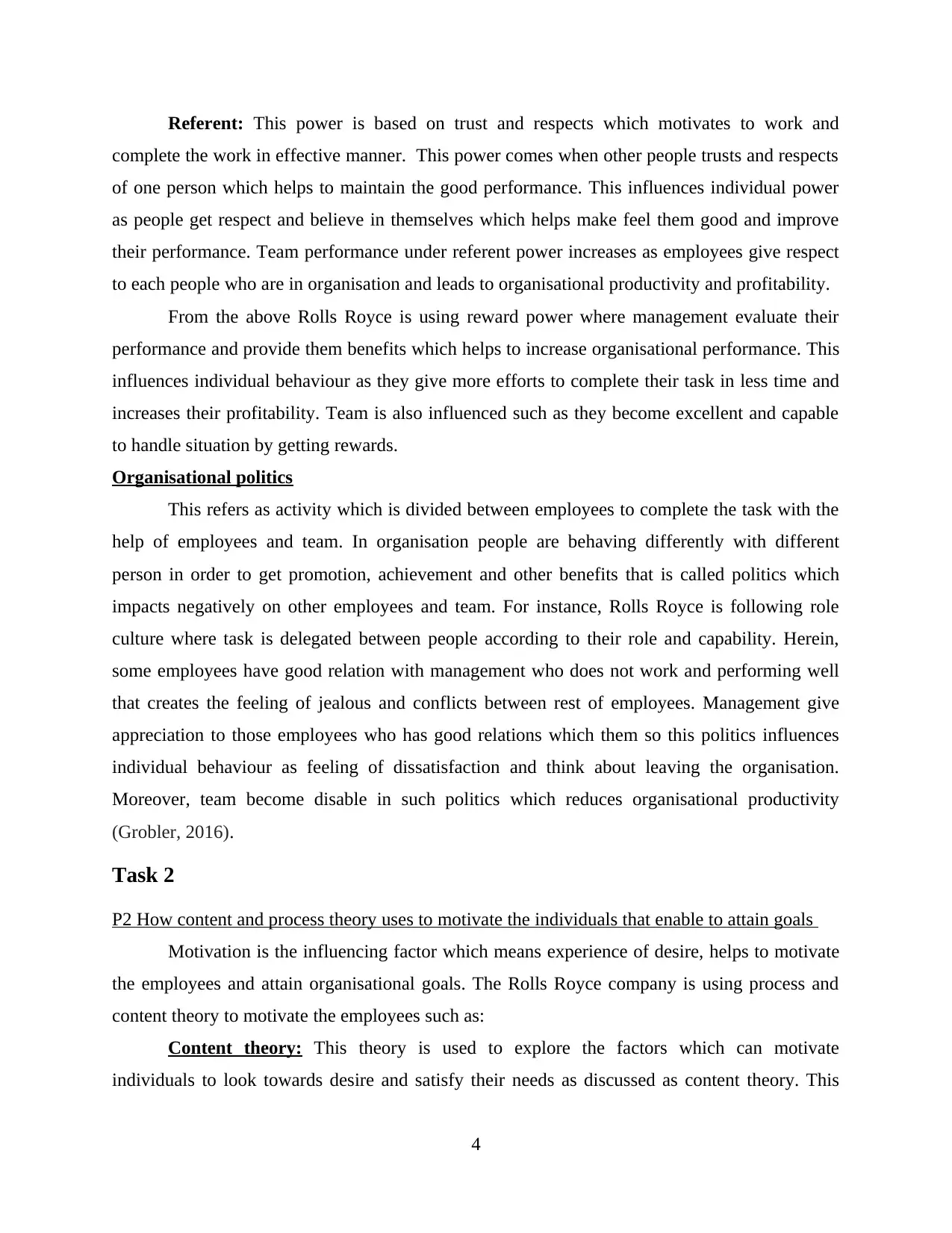
Referent: This power is based on trust and respects which motivates to work and
complete the work in effective manner. This power comes when other people trusts and respects
of one person which helps to maintain the good performance. This influences individual power
as people get respect and believe in themselves which helps make feel them good and improve
their performance. Team performance under referent power increases as employees give respect
to each people who are in organisation and leads to organisational productivity and profitability.
From the above Rolls Royce is using reward power where management evaluate their
performance and provide them benefits which helps to increase organisational performance. This
influences individual behaviour as they give more efforts to complete their task in less time and
increases their profitability. Team is also influenced such as they become excellent and capable
to handle situation by getting rewards.
Organisational politics
This refers as activity which is divided between employees to complete the task with the
help of employees and team. In organisation people are behaving differently with different
person in order to get promotion, achievement and other benefits that is called politics which
impacts negatively on other employees and team. For instance, Rolls Royce is following role
culture where task is delegated between people according to their role and capability. Herein,
some employees have good relation with management who does not work and performing well
that creates the feeling of jealous and conflicts between rest of employees. Management give
appreciation to those employees who has good relations which them so this politics influences
individual behaviour as feeling of dissatisfaction and think about leaving the organisation.
Moreover, team become disable in such politics which reduces organisational productivity
(Grobler, 2016).
Task 2
P2 How content and process theory uses to motivate the individuals that enable to attain goals
Motivation is the influencing factor which means experience of desire, helps to motivate
the employees and attain organisational goals. The Rolls Royce company is using process and
content theory to motivate the employees such as:
Content theory: This theory is used to explore the factors which can motivate
individuals to look towards desire and satisfy their needs as discussed as content theory. This
4
complete the work in effective manner. This power comes when other people trusts and respects
of one person which helps to maintain the good performance. This influences individual power
as people get respect and believe in themselves which helps make feel them good and improve
their performance. Team performance under referent power increases as employees give respect
to each people who are in organisation and leads to organisational productivity and profitability.
From the above Rolls Royce is using reward power where management evaluate their
performance and provide them benefits which helps to increase organisational performance. This
influences individual behaviour as they give more efforts to complete their task in less time and
increases their profitability. Team is also influenced such as they become excellent and capable
to handle situation by getting rewards.
Organisational politics
This refers as activity which is divided between employees to complete the task with the
help of employees and team. In organisation people are behaving differently with different
person in order to get promotion, achievement and other benefits that is called politics which
impacts negatively on other employees and team. For instance, Rolls Royce is following role
culture where task is delegated between people according to their role and capability. Herein,
some employees have good relation with management who does not work and performing well
that creates the feeling of jealous and conflicts between rest of employees. Management give
appreciation to those employees who has good relations which them so this politics influences
individual behaviour as feeling of dissatisfaction and think about leaving the organisation.
Moreover, team become disable in such politics which reduces organisational productivity
(Grobler, 2016).
Task 2
P2 How content and process theory uses to motivate the individuals that enable to attain goals
Motivation is the influencing factor which means experience of desire, helps to motivate
the employees and attain organisational goals. The Rolls Royce company is using process and
content theory to motivate the employees such as:
Content theory: This theory is used to explore the factors which can motivate
individuals to look towards desire and satisfy their needs as discussed as content theory. This
4
Paraphrase This Document
Need a fresh take? Get an instant paraphrase of this document with our AI Paraphraser
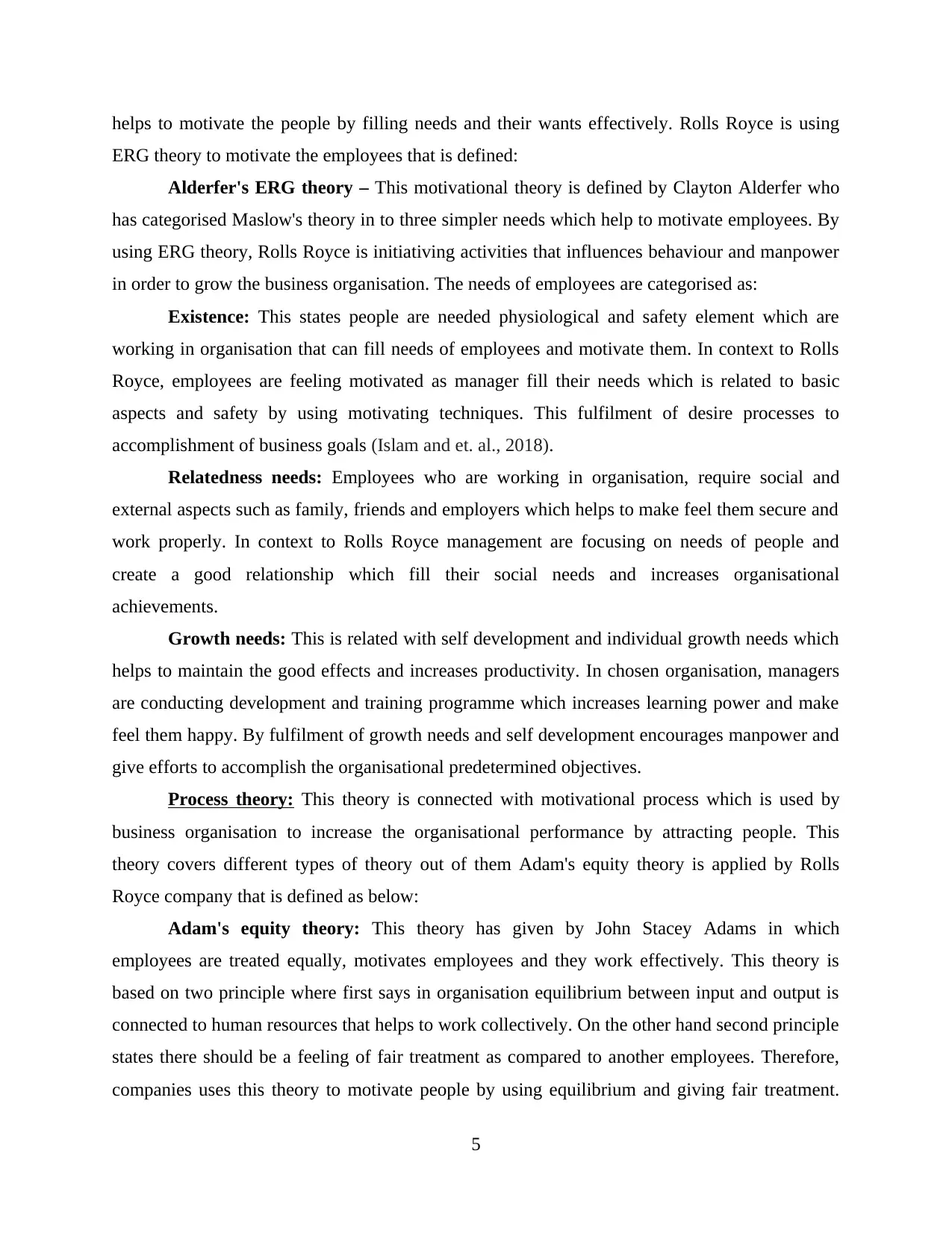
helps to motivate the people by filling needs and their wants effectively. Rolls Royce is using
ERG theory to motivate the employees that is defined:
Alderfer's ERG theory – This motivational theory is defined by Clayton Alderfer who
has categorised Maslow's theory in to three simpler needs which help to motivate employees. By
using ERG theory, Rolls Royce is initiativing activities that influences behaviour and manpower
in order to grow the business organisation. The needs of employees are categorised as:
Existence: This states people are needed physiological and safety element which are
working in organisation that can fill needs of employees and motivate them. In context to Rolls
Royce, employees are feeling motivated as manager fill their needs which is related to basic
aspects and safety by using motivating techniques. This fulfilment of desire processes to
accomplishment of business goals (Islam and et. al., 2018).
Relatedness needs: Employees who are working in organisation, require social and
external aspects such as family, friends and employers which helps to make feel them secure and
work properly. In context to Rolls Royce management are focusing on needs of people and
create a good relationship which fill their social needs and increases organisational
achievements.
Growth needs: This is related with self development and individual growth needs which
helps to maintain the good effects and increases productivity. In chosen organisation, managers
are conducting development and training programme which increases learning power and make
feel them happy. By fulfilment of growth needs and self development encourages manpower and
give efforts to accomplish the organisational predetermined objectives.
Process theory: This theory is connected with motivational process which is used by
business organisation to increase the organisational performance by attracting people. This
theory covers different types of theory out of them Adam's equity theory is applied by Rolls
Royce company that is defined as below:
Adam's equity theory: This theory has given by John Stacey Adams in which
employees are treated equally, motivates employees and they work effectively. This theory is
based on two principle where first says in organisation equilibrium between input and output is
connected to human resources that helps to work collectively. On the other hand second principle
states there should be a feeling of fair treatment as compared to another employees. Therefore,
companies uses this theory to motivate people by using equilibrium and giving fair treatment.
5
ERG theory to motivate the employees that is defined:
Alderfer's ERG theory – This motivational theory is defined by Clayton Alderfer who
has categorised Maslow's theory in to three simpler needs which help to motivate employees. By
using ERG theory, Rolls Royce is initiativing activities that influences behaviour and manpower
in order to grow the business organisation. The needs of employees are categorised as:
Existence: This states people are needed physiological and safety element which are
working in organisation that can fill needs of employees and motivate them. In context to Rolls
Royce, employees are feeling motivated as manager fill their needs which is related to basic
aspects and safety by using motivating techniques. This fulfilment of desire processes to
accomplishment of business goals (Islam and et. al., 2018).
Relatedness needs: Employees who are working in organisation, require social and
external aspects such as family, friends and employers which helps to make feel them secure and
work properly. In context to Rolls Royce management are focusing on needs of people and
create a good relationship which fill their social needs and increases organisational
achievements.
Growth needs: This is related with self development and individual growth needs which
helps to maintain the good effects and increases productivity. In chosen organisation, managers
are conducting development and training programme which increases learning power and make
feel them happy. By fulfilment of growth needs and self development encourages manpower and
give efforts to accomplish the organisational predetermined objectives.
Process theory: This theory is connected with motivational process which is used by
business organisation to increase the organisational performance by attracting people. This
theory covers different types of theory out of them Adam's equity theory is applied by Rolls
Royce company that is defined as below:
Adam's equity theory: This theory has given by John Stacey Adams in which
employees are treated equally, motivates employees and they work effectively. This theory is
based on two principle where first says in organisation equilibrium between input and output is
connected to human resources that helps to work collectively. On the other hand second principle
states there should be a feeling of fair treatment as compared to another employees. Therefore,
companies uses this theory to motivate people by using equilibrium and giving fair treatment.
5
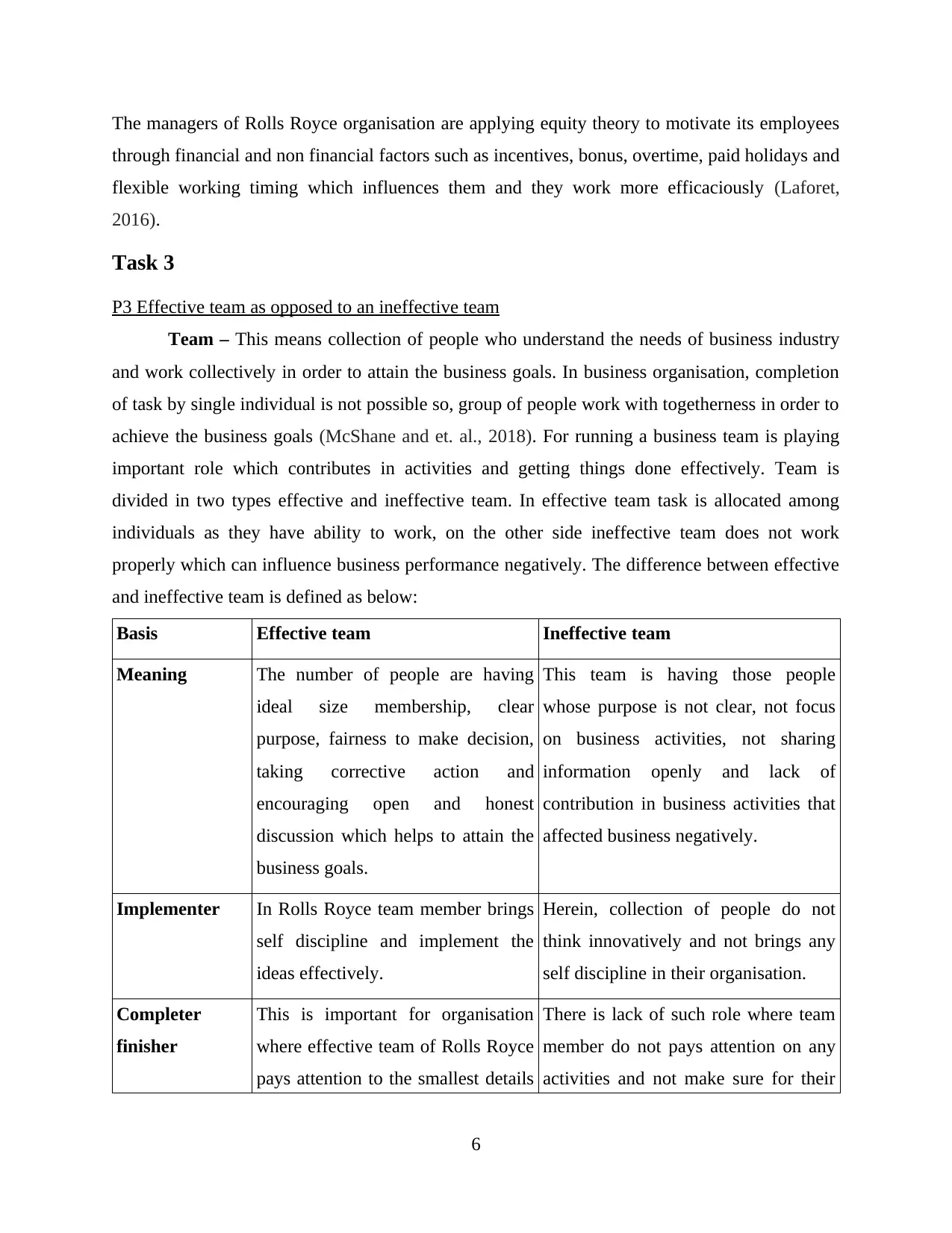
The managers of Rolls Royce organisation are applying equity theory to motivate its employees
through financial and non financial factors such as incentives, bonus, overtime, paid holidays and
flexible working timing which influences them and they work more efficaciously (Laforet,
2016).
Task 3
P3 Effective team as opposed to an ineffective team
Team – This means collection of people who understand the needs of business industry
and work collectively in order to attain the business goals. In business organisation, completion
of task by single individual is not possible so, group of people work with togetherness in order to
achieve the business goals (McShane and et. al., 2018). For running a business team is playing
important role which contributes in activities and getting things done effectively. Team is
divided in two types effective and ineffective team. In effective team task is allocated among
individuals as they have ability to work, on the other side ineffective team does not work
properly which can influence business performance negatively. The difference between effective
and ineffective team is defined as below:
Basis Effective team Ineffective team
Meaning The number of people are having
ideal size membership, clear
purpose, fairness to make decision,
taking corrective action and
encouraging open and honest
discussion which helps to attain the
business goals.
This team is having those people
whose purpose is not clear, not focus
on business activities, not sharing
information openly and lack of
contribution in business activities that
affected business negatively.
Implementer In Rolls Royce team member brings
self discipline and implement the
ideas effectively.
Herein, collection of people do not
think innovatively and not brings any
self discipline in their organisation.
Completer
finisher
This is important for organisation
where effective team of Rolls Royce
pays attention to the smallest details
There is lack of such role where team
member do not pays attention on any
activities and not make sure for their
6
through financial and non financial factors such as incentives, bonus, overtime, paid holidays and
flexible working timing which influences them and they work more efficaciously (Laforet,
2016).
Task 3
P3 Effective team as opposed to an ineffective team
Team – This means collection of people who understand the needs of business industry
and work collectively in order to attain the business goals. In business organisation, completion
of task by single individual is not possible so, group of people work with togetherness in order to
achieve the business goals (McShane and et. al., 2018). For running a business team is playing
important role which contributes in activities and getting things done effectively. Team is
divided in two types effective and ineffective team. In effective team task is allocated among
individuals as they have ability to work, on the other side ineffective team does not work
properly which can influence business performance negatively. The difference between effective
and ineffective team is defined as below:
Basis Effective team Ineffective team
Meaning The number of people are having
ideal size membership, clear
purpose, fairness to make decision,
taking corrective action and
encouraging open and honest
discussion which helps to attain the
business goals.
This team is having those people
whose purpose is not clear, not focus
on business activities, not sharing
information openly and lack of
contribution in business activities that
affected business negatively.
Implementer In Rolls Royce team member brings
self discipline and implement the
ideas effectively.
Herein, collection of people do not
think innovatively and not brings any
self discipline in their organisation.
Completer
finisher
This is important for organisation
where effective team of Rolls Royce
pays attention to the smallest details
There is lack of such role where team
member do not pays attention on any
activities and not make sure for their
6
⊘ This is a preview!⊘
Do you want full access?
Subscribe today to unlock all pages.

Trusted by 1+ million students worldwide
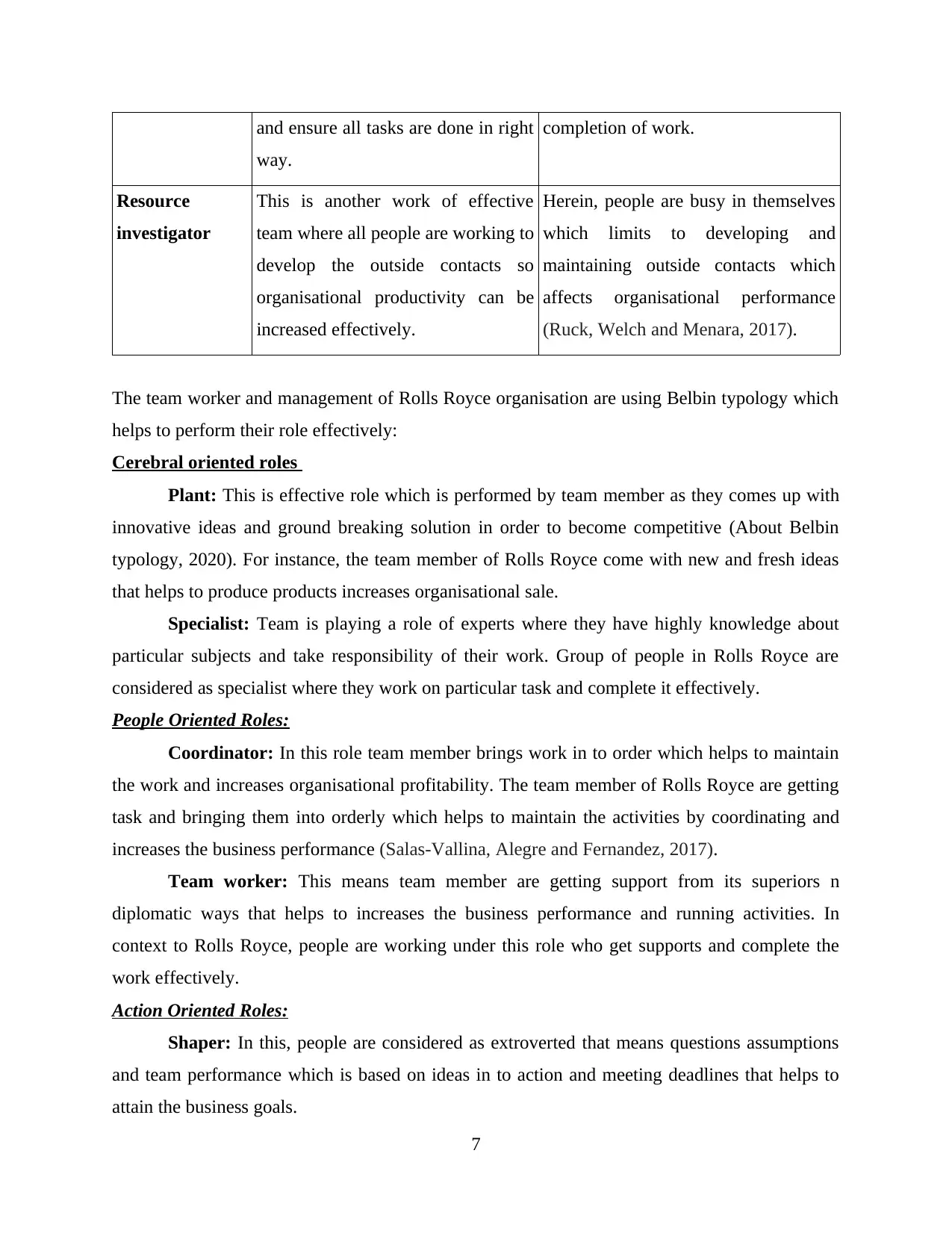
and ensure all tasks are done in right
way.
completion of work.
Resource
investigator
This is another work of effective
team where all people are working to
develop the outside contacts so
organisational productivity can be
increased effectively.
Herein, people are busy in themselves
which limits to developing and
maintaining outside contacts which
affects organisational performance
(Ruck, Welch and Menara, 2017).
The team worker and management of Rolls Royce organisation are using Belbin typology which
helps to perform their role effectively:
Cerebral oriented roles
Plant: This is effective role which is performed by team member as they comes up with
innovative ideas and ground breaking solution in order to become competitive (About Belbin
typology, 2020). For instance, the team member of Rolls Royce come with new and fresh ideas
that helps to produce products increases organisational sale.
Specialist: Team is playing a role of experts where they have highly knowledge about
particular subjects and take responsibility of their work. Group of people in Rolls Royce are
considered as specialist where they work on particular task and complete it effectively.
People Oriented Roles:
Coordinator: In this role team member brings work in to order which helps to maintain
the work and increases organisational profitability. The team member of Rolls Royce are getting
task and bringing them into orderly which helps to maintain the activities by coordinating and
increases the business performance (Salas-Vallina, Alegre and Fernandez, 2017).
Team worker: This means team member are getting support from its superiors n
diplomatic ways that helps to increases the business performance and running activities. In
context to Rolls Royce, people are working under this role who get supports and complete the
work effectively.
Action Oriented Roles:
Shaper: In this, people are considered as extroverted that means questions assumptions
and team performance which is based on ideas in to action and meeting deadlines that helps to
attain the business goals.
7
way.
completion of work.
Resource
investigator
This is another work of effective
team where all people are working to
develop the outside contacts so
organisational productivity can be
increased effectively.
Herein, people are busy in themselves
which limits to developing and
maintaining outside contacts which
affects organisational performance
(Ruck, Welch and Menara, 2017).
The team worker and management of Rolls Royce organisation are using Belbin typology which
helps to perform their role effectively:
Cerebral oriented roles
Plant: This is effective role which is performed by team member as they comes up with
innovative ideas and ground breaking solution in order to become competitive (About Belbin
typology, 2020). For instance, the team member of Rolls Royce come with new and fresh ideas
that helps to produce products increases organisational sale.
Specialist: Team is playing a role of experts where they have highly knowledge about
particular subjects and take responsibility of their work. Group of people in Rolls Royce are
considered as specialist where they work on particular task and complete it effectively.
People Oriented Roles:
Coordinator: In this role team member brings work in to order which helps to maintain
the work and increases organisational profitability. The team member of Rolls Royce are getting
task and bringing them into orderly which helps to maintain the activities by coordinating and
increases the business performance (Salas-Vallina, Alegre and Fernandez, 2017).
Team worker: This means team member are getting support from its superiors n
diplomatic ways that helps to increases the business performance and running activities. In
context to Rolls Royce, people are working under this role who get supports and complete the
work effectively.
Action Oriented Roles:
Shaper: In this, people are considered as extroverted that means questions assumptions
and team performance which is based on ideas in to action and meeting deadlines that helps to
attain the business goals.
7
Paraphrase This Document
Need a fresh take? Get an instant paraphrase of this document with our AI Paraphraser
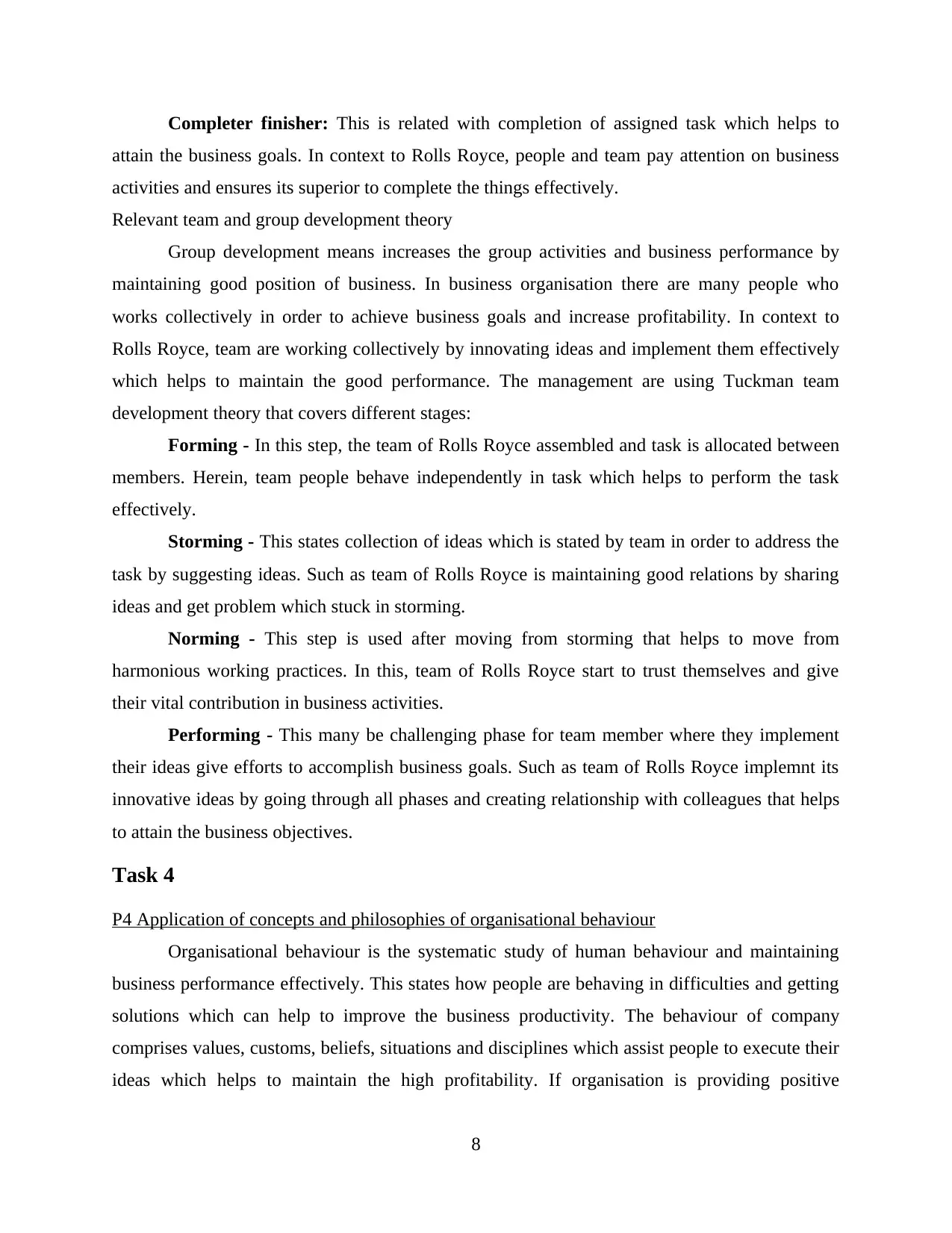
Completer finisher: This is related with completion of assigned task which helps to
attain the business goals. In context to Rolls Royce, people and team pay attention on business
activities and ensures its superior to complete the things effectively.
Relevant team and group development theory
Group development means increases the group activities and business performance by
maintaining good position of business. In business organisation there are many people who
works collectively in order to achieve business goals and increase profitability. In context to
Rolls Royce, team are working collectively by innovating ideas and implement them effectively
which helps to maintain the good performance. The management are using Tuckman team
development theory that covers different stages:
Forming - In this step, the team of Rolls Royce assembled and task is allocated between
members. Herein, team people behave independently in task which helps to perform the task
effectively.
Storming - This states collection of ideas which is stated by team in order to address the
task by suggesting ideas. Such as team of Rolls Royce is maintaining good relations by sharing
ideas and get problem which stuck in storming.
Norming - This step is used after moving from storming that helps to move from
harmonious working practices. In this, team of Rolls Royce start to trust themselves and give
their vital contribution in business activities.
Performing - This many be challenging phase for team member where they implement
their ideas give efforts to accomplish business goals. Such as team of Rolls Royce implemnt its
innovative ideas by going through all phases and creating relationship with colleagues that helps
to attain the business objectives.
Task 4
P4 Application of concepts and philosophies of organisational behaviour
Organisational behaviour is the systematic study of human behaviour and maintaining
business performance effectively. This states how people are behaving in difficulties and getting
solutions which can help to improve the business productivity. The behaviour of company
comprises values, customs, beliefs, situations and disciplines which assist people to execute their
ideas which helps to maintain the high profitability. If organisation is providing positive
8
attain the business goals. In context to Rolls Royce, people and team pay attention on business
activities and ensures its superior to complete the things effectively.
Relevant team and group development theory
Group development means increases the group activities and business performance by
maintaining good position of business. In business organisation there are many people who
works collectively in order to achieve business goals and increase profitability. In context to
Rolls Royce, team are working collectively by innovating ideas and implement them effectively
which helps to maintain the good performance. The management are using Tuckman team
development theory that covers different stages:
Forming - In this step, the team of Rolls Royce assembled and task is allocated between
members. Herein, team people behave independently in task which helps to perform the task
effectively.
Storming - This states collection of ideas which is stated by team in order to address the
task by suggesting ideas. Such as team of Rolls Royce is maintaining good relations by sharing
ideas and get problem which stuck in storming.
Norming - This step is used after moving from storming that helps to move from
harmonious working practices. In this, team of Rolls Royce start to trust themselves and give
their vital contribution in business activities.
Performing - This many be challenging phase for team member where they implement
their ideas give efforts to accomplish business goals. Such as team of Rolls Royce implemnt its
innovative ideas by going through all phases and creating relationship with colleagues that helps
to attain the business objectives.
Task 4
P4 Application of concepts and philosophies of organisational behaviour
Organisational behaviour is the systematic study of human behaviour and maintaining
business performance effectively. This states how people are behaving in difficulties and getting
solutions which can help to improve the business productivity. The behaviour of company
comprises values, customs, beliefs, situations and disciplines which assist people to execute their
ideas which helps to maintain the high profitability. If organisation is providing positive
8
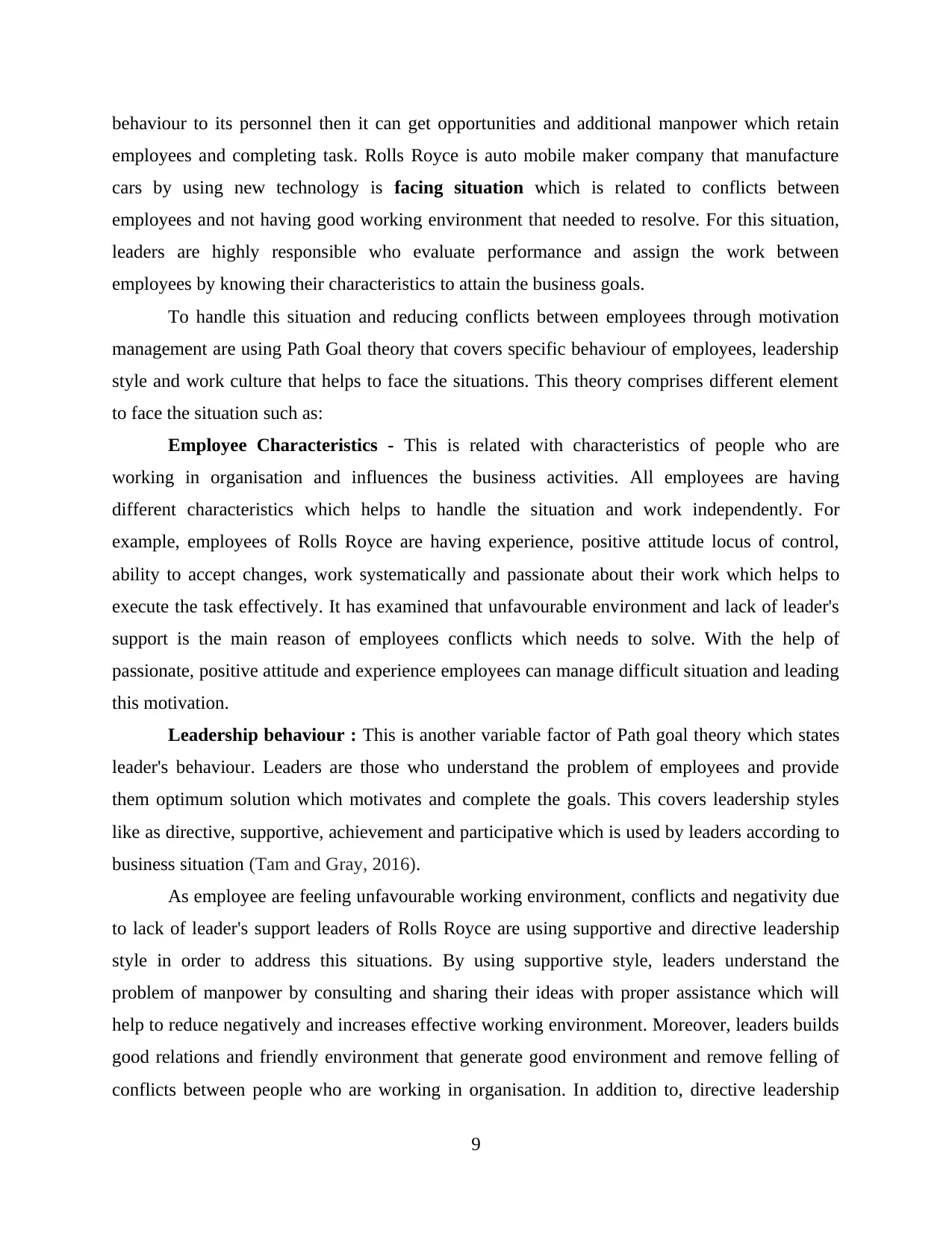
behaviour to its personnel then it can get opportunities and additional manpower which retain
employees and completing task. Rolls Royce is auto mobile maker company that manufacture
cars by using new technology is facing situation which is related to conflicts between
employees and not having good working environment that needed to resolve. For this situation,
leaders are highly responsible who evaluate performance and assign the work between
employees by knowing their characteristics to attain the business goals.
To handle this situation and reducing conflicts between employees through motivation
management are using Path Goal theory that covers specific behaviour of employees, leadership
style and work culture that helps to face the situations. This theory comprises different element
to face the situation such as:
Employee Characteristics - This is related with characteristics of people who are
working in organisation and influences the business activities. All employees are having
different characteristics which helps to handle the situation and work independently. For
example, employees of Rolls Royce are having experience, positive attitude locus of control,
ability to accept changes, work systematically and passionate about their work which helps to
execute the task effectively. It has examined that unfavourable environment and lack of leader's
support is the main reason of employees conflicts which needs to solve. With the help of
passionate, positive attitude and experience employees can manage difficult situation and leading
this motivation.
Leadership behaviour : This is another variable factor of Path goal theory which states
leader's behaviour. Leaders are those who understand the problem of employees and provide
them optimum solution which motivates and complete the goals. This covers leadership styles
like as directive, supportive, achievement and participative which is used by leaders according to
business situation (Tam and Gray, 2016).
As employee are feeling unfavourable working environment, conflicts and negativity due
to lack of leader's support leaders of Rolls Royce are using supportive and directive leadership
style in order to address this situations. By using supportive style, leaders understand the
problem of manpower by consulting and sharing their ideas with proper assistance which will
help to reduce negatively and increases effective working environment. Moreover, leaders builds
good relations and friendly environment that generate good environment and remove felling of
conflicts between people who are working in organisation. In addition to, directive leadership
9
employees and completing task. Rolls Royce is auto mobile maker company that manufacture
cars by using new technology is facing situation which is related to conflicts between
employees and not having good working environment that needed to resolve. For this situation,
leaders are highly responsible who evaluate performance and assign the work between
employees by knowing their characteristics to attain the business goals.
To handle this situation and reducing conflicts between employees through motivation
management are using Path Goal theory that covers specific behaviour of employees, leadership
style and work culture that helps to face the situations. This theory comprises different element
to face the situation such as:
Employee Characteristics - This is related with characteristics of people who are
working in organisation and influences the business activities. All employees are having
different characteristics which helps to handle the situation and work independently. For
example, employees of Rolls Royce are having experience, positive attitude locus of control,
ability to accept changes, work systematically and passionate about their work which helps to
execute the task effectively. It has examined that unfavourable environment and lack of leader's
support is the main reason of employees conflicts which needs to solve. With the help of
passionate, positive attitude and experience employees can manage difficult situation and leading
this motivation.
Leadership behaviour : This is another variable factor of Path goal theory which states
leader's behaviour. Leaders are those who understand the problem of employees and provide
them optimum solution which motivates and complete the goals. This covers leadership styles
like as directive, supportive, achievement and participative which is used by leaders according to
business situation (Tam and Gray, 2016).
As employee are feeling unfavourable working environment, conflicts and negativity due
to lack of leader's support leaders of Rolls Royce are using supportive and directive leadership
style in order to address this situations. By using supportive style, leaders understand the
problem of manpower by consulting and sharing their ideas with proper assistance which will
help to reduce negatively and increases effective working environment. Moreover, leaders builds
good relations and friendly environment that generate good environment and remove felling of
conflicts between people who are working in organisation. In addition to, directive leadership
9
⊘ This is a preview!⊘
Do you want full access?
Subscribe today to unlock all pages.

Trusted by 1+ million students worldwide
1 out of 15
Related Documents
Your All-in-One AI-Powered Toolkit for Academic Success.
+13062052269
info@desklib.com
Available 24*7 on WhatsApp / Email
![[object Object]](/_next/static/media/star-bottom.7253800d.svg)
Unlock your academic potential
Copyright © 2020–2026 A2Z Services. All Rights Reserved. Developed and managed by ZUCOL.





